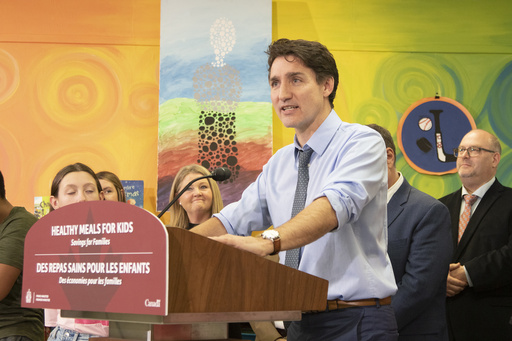
TORONTO — Canada’s representative in Washington has indicated that Prime Minister Justin Trudeau made notable progress in discussions with President-elect Donald Trump regarding the treatment of Canada alongside Mexico, especially concerning issues of drug trafficking and immigration. Kirsten Hillman, the Canadian ambassador, shared insights from Trudeau’s recent dinner meeting with Trump, asserting that it was pivotal in addressing concerns about potential tariffs on Canadian goods.
Hillman, who was present at Trump’s Mar-a-Lago resort in Florida, recounted that Trudeau initiated the request for a personal meeting during a phone call last Monday, leading to the dinner invitation for that Friday. During their discussion, Hillman emphasized the significant differences between the Canada-U.S. border and the Mexico-U.S. border, stating, “The message that our border is so vastly different than the Mexican border was really understood.”
The dinner conversation was largely centered around Trump’s worries related to border security. Hillman highlighted Trudeau’s emphasis on the distinct nature of the two borders, pointing out that Canada does not contribute to the flow of fentanyl into the U.S. She noted that U.S. authorities have found that 99.8% of fentanyl involved in trafficking is sourced from Mexico rather than Canada, where drug seizures are predominantly for personal use rather than organized trafficking.
Statistics show that last fiscal year, U.S. customs seized merely 43 pounds of fentanyl at the Canadian border, starkly contrasted with the 21,100 pounds intercepted from the Mexican border. In terms of illegal crossings, Hillman stated that only 0.6% of apprehensions in the U.S. were linked to individuals illegally crossing from Canada, and she mentioned a drop in migrant numbers since summer.
Despite the current figures, she asserted that Canada is poised to bolster its border security measures, including plans for enhanced surveillance with helicopters and drones, as well as increased law enforcement presence. Hillman also pointed to an agreement between Canada and the U.S. that allows migrants who cross illegally to be sent back to Canada—a point of distinction as Mexico lacks a similar arrangement.
Throughout the three-hour dinner, trade relations were also a focal point. Hillman discussed the U.S. trade deficit with Canada, which stood at $75 billion last year, noting that a significant portion of this includes energy exports. She reiterated that balanced trade discussions are imperative. “We are one-tenth the size of the United States,” she said, explaining that if trade were balanced per capita, Canada would be buying significantly more from the U.S. than vice versa.
The gathering included several prominent figures, such as Trump’s nominee for commerce secretary Howard Lutnick, North Dakota Governor Doug Burgum, and other administration officials, along with key Canadian representatives. Hillman expressed optimism about the outcome of the meeting, indicating that discussions would continue in the weeks ahead to address Trump’s concerns.
While Trump described the talks as “productive,” he showed no signs of reconsidering his stance on tariffs. Hillman remarked on the good rapport between Trump and Trudeau, noting that the dinner also allowed for a social interaction in which Trump shared his admiration for Canadian artist Celine Dion. She concluded that the meeting could not have gone better, with the exception of a definitive commitment against tariffs, which was not realistically expected.
